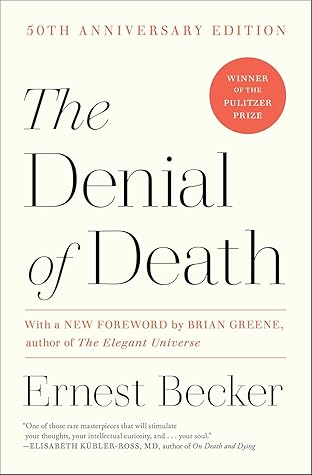More on this book
Community
Kindle Notes & Highlights
The hostility to psychoanalysis in the past, today, and in the future, will always be a hostility against admitting that man lives by lying to himself about himself and about his world, and that character, to follow Ferenczi and Brown, is a vital lie.
I therefore maintain that the fear of death is to be regarded as an analogue of the fear of castration, and that the situation to which the ego reacts is the state of being forsaken or deserted by the protecting superego—by the powers of destiny—which puts an end to security against every danger.
The result is that we now know that the human animal is characterized by two great fears that other animals are protected from: the fear of life and the fear of death.
As Ortega so well put it in the epigraph we have used for this chapter, man uses his ideas for the defense of his existence, to frighten away reality.
every human being is… equally unfree, that is, we… create out of freedom, a prison….
lacks the secure cultural programming of average
The whole order of things fills me with a sense of anguish, from the gnat to the mysteries of incarnation; all is entirely unintelligible to me, and particularly my own person. Great is my sorrow, without limits. None knows of it, except God in Heaven, and He cannot have pity.
in words that are almost Kierkegaard’s: how is a person being enslaved by his characterological lie about himself?
He is intent on describing what we today call “inauthentic” men, men who avoid developing their own uniqueness; they follow out the styles of automatic and uncritical living in which they were conditioned as children.
They are “inauthentic” in that they do not belong to themselves, are not “their own” person, do not act from their own center, do not see reality on its terms; they are the one-dimensional men totally immersed in the fictional games being played in their society, unable to transcend their social conditioning: the corporation men in the West, the bureaucrats in the East, the tribal men locked up in tradition—man everywhere who doesn’t understand what it means to think for himself and who, if he did, would shrink back at the idea of such audacity and exposure.
he dies; the parson introduces him into eternity for the price of $10—but a self he was not, and a self he did not become…. For the immediate man does not recognize his self, he recognizes himself only by his dress,… he recognizes that he has a self only by externals.18
Why does man accept to live a trivial life? Because of the danger of a full horizon of experience, of course. This is the deeper motivation of philistinism, that it celebrates the triumph over possibility, over freedom. Philistinism knows its real enemy: freedom is dangerous. If you follow it too willingly it threatens to pull you into the air; if you give it up too wholly, you become a prisoner of necessity. The safest thing is to toe the mark of what is socially possible. I think this is the meaning of Kierkegaard’s observation:
The loss of possibility signifies: either that everything has become necessary to man or that everything has become trivial.32
He holds on to the people who have enslaved him in a network of crushing obligations, belittling interaction, precisely because these people are his shelter, his strength, his protection against the world. Like most everyone else the depressed person is a coward who will not stand alone on his own center, who cannot draw from within himself the necessary strength to face up to life. So he embeds himself in others;
It is frightening to be in such a bind. One chooses slavery because it is safe and meaningful; then one loses the meaning of it, but fears to move out of it. One has literally died to life but must remain physically in this world. And thus the torture of depressive psychosis: to remain steeped in one’s failure and yet to justify it, to continue to draw a sense of worth-whileness out of it.‡
There is the type of man who has great contempt for “immediacy,” who tries to cultivate his interiority, base his pride on something deeper and inner, create a distance between himself and the average man. Kierkegaard calls this type of man the “introvert.”


